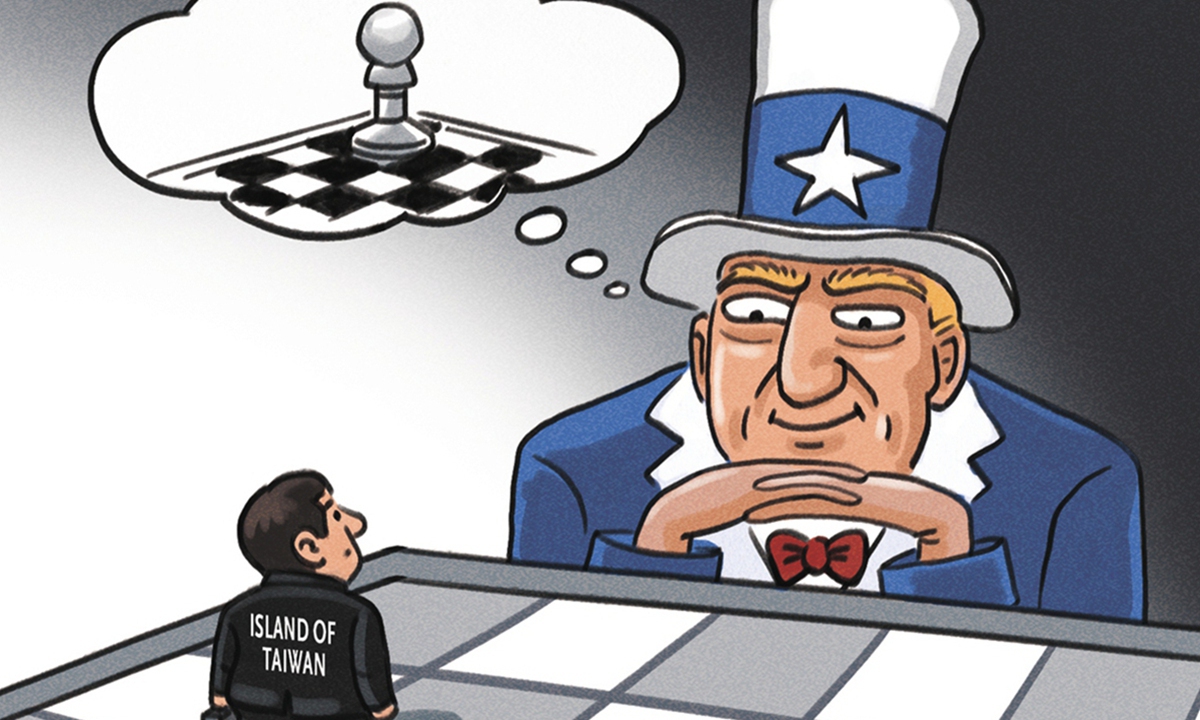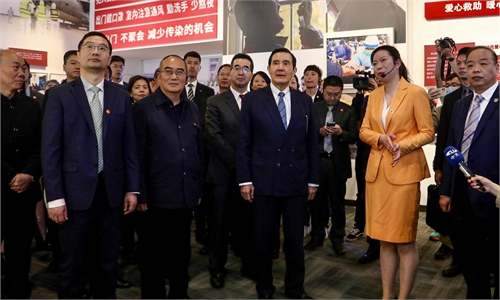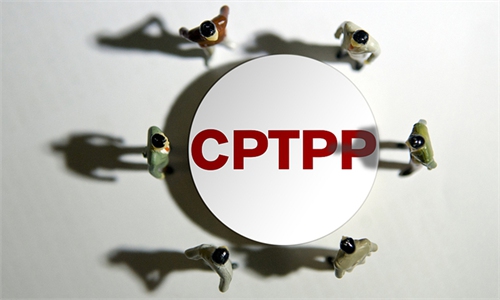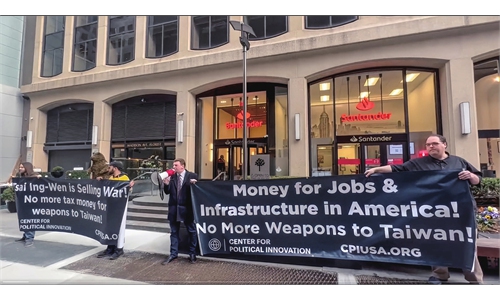
Illustration: Liu Rui/GT
Taiwan regional leader Tsai Ing-wen met with top House Democrat Hakeem Jeffries in New York on March 30. Following a tour of Central America, Tsai plans to meet US Speaker of the House Kevin McCarthy in California on Wednesday. These high-profile visits serve to further enflame US-China relations, apparently by design. It is worth looking at the deeper reasons behind rising US-China tensions.
During World War II, the top think tank in the US was the CFR, Wall Street's Council on Foreign Relations. Heavily funded by US big business, the CFR's hand-picked coterie of compatible experts was to formulate US grand strategy at the outbreak of fighting in Europe. Assessing that the US would eventually enter and win the war, CFR planners formulated a scheme for postwar US hegemony over the capitalist world.
Given that the US public was largely anti-interventionist after World War I, the CFR needed a big publicity campaign to bring the American people around. CFR member Henry Luce - publisher of Time, Life, and Fortune magazines - was the man for the job. Luce announced "The American Century" in a Life magazine essay. In vague but portentous language, Luce conveyed the global scope of US ambitions. "Freedom," he wrote, "requires and will require far greater living space than tyranny."
There were notable dissenters from Wall Street's plan for US dominance. US vice president Henry Wallace called instead for a "Century of the Common Man" in which American technology and power could be shared with other nations, allowing for an international order characterized by "win-win" relationships between nation-states. In 1944, Wallace wrote an op-ed for the New York Times entitled "The Danger of American Fascism." In this article, the US vice president wrote, "If we define an American fascist as one who in case of conflict puts money and power ahead of human beings, then there are undoubtedly several million fascists in the United States. There are probably several hundred thousand if we narrow the definition to include only those who in their search for money and power are ruthless and deceitful. [Fascism's] greatest threat to the United States will come after the war, either via Latin America or within the United States itself."
A few months later, at the 1944 Democratic National Convention, Wallace was removed from the Democratic ticket through a coup led by Edwin Pauley. An oilman who had become Treasurer of the Democratic Party, Pauley would seem to conform to Wallace's definition of fascism.
Wallace's defeat at the hands of these forces served to foreshadow the history that would follow. In the years after World War II, the US presided over the capitalist world. American statesmen strove to manage the dissolution of European colonialism while retaining imperialist North-South economic relations through what Kwame Nkrumah famously called neocolonialism. Cold War "containment" was institutionalized as foreign policy. After suffering a lot in World War II fighting fascists, the USSR and China were not spoiling for a fight with the US. However, European neutrality and European trade with the Soviet bloc threatened to undermine US plans for the "American Century." This was spelled out in NSC-68, a secret 1950 study from the US National Security Council. NSC-68 argued that the inability to earn dollars would lead US allies to slouch toward neutrality vis-à-vis the US and the Soviet bloc. The solution was a ramping up of the Cold War and massive US military spending to shore up the proper flows of trade and investment across the Atlantic and Pacific. This allowed the US to consolidate itself as the hegemonic center of gravity.
With the end of the Cold War, the US sought to expand its dominance further into the energy heartlands of the Middle East and into the former sphere of Soviet influence in East Europe, the Balkans, and Central Asia. The effort to establish a new "American Century" has been a series of calamities. Witness the disastrous "9/11 wars" in Afghanistan and Iraq, the "Arab Spring wars" in Libya and Syria, and the current war in Ukraine which resulted from NATO expansion.
China, on the other hand, has been carrying out a national project with no historical equal. Beginning in the latter decades of the 20th century, China has lifted hundreds of millions of Chinese people out of poverty. The Chinese have also reemerged on the world stage, offering a "win-win" diplomatic alternative to the US. Meanwhile, Washington seeks to maintain the "rules-based liberal international order," an Orwellian euphemism to describe what essentially the US is asserting its divine right to act as global sovereign.
This is the context in which we must view recent US provocations regarding the Taiwan question. Taiwan is recognized by US elites as an extremely sensitive red line for China. As the trends for continued US hegemony were looking shakier, the US embarked on its Ukrainian gambit whose disastrous results will be felt by the surviving Ukrainians for decades to come. With the catastrophe unfolding in Ukraine, US neoconservatives appear to be hoping that Taiwan can become a flashpoint for a conflict which will put the US back on top. Let us hope that cooler heads prevail on both sides of the Taiwan Straits.
"America," said Henry Kissinger, "has no permanent friends or enemies, only interests." The people on the Taiwan island should take this to heart. If the debacle in Ukraine is not sufficient, they could look to the Kurds, or to Afghanistan in order to see what happens to America's "friends."
Winston Churchill was quoted as saying, "You can depend upon the Americans to do the right thing. But only after they have exhausted every other possibility." It would seem that US leaders have arrived at the point where they have indeed "exhausted every other possibility." At pivotal moments, two US statesmen - vice president Henry Wallace and president John F. Kennedy - called for an end to conflict and domination as the prevailing framework of the international system. Wallace and Kennedy could not overcome imperialist elements of the US elites, but circumstances change. The best thing right now for people in the Chinese mainland, the island of Taiwan, and the US - and for human civilization as a whole - would be for all parties to step back from the brink and begin anew the quest for peace. It is time to negotiate a new international order based on international law and the indivisibility of security.
The author is a US historian and political scientist who runs the American Exception podcast. opinion@globaltimes.com.cn



